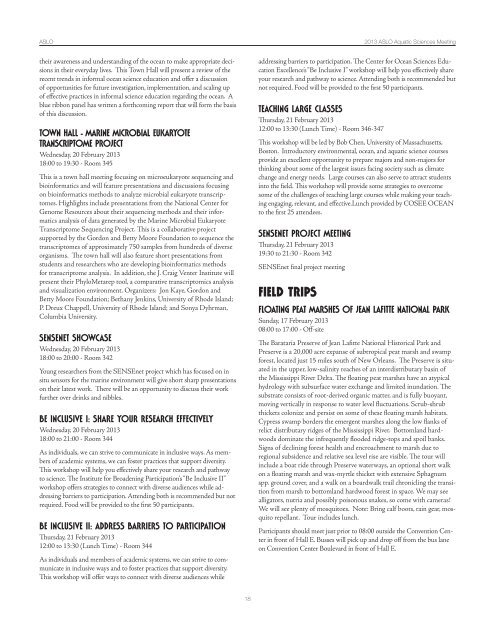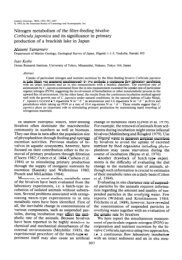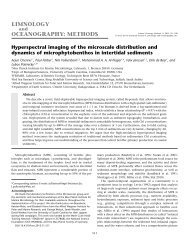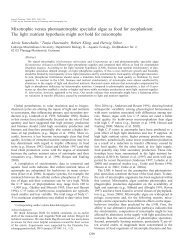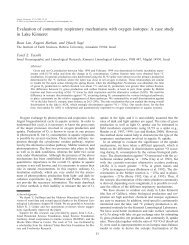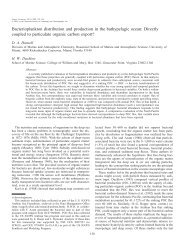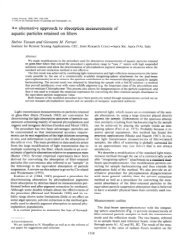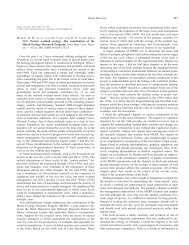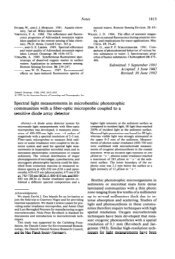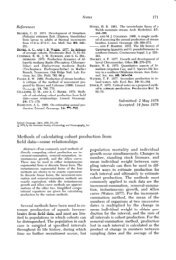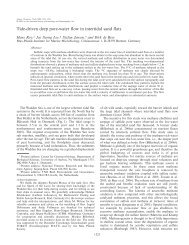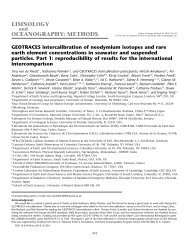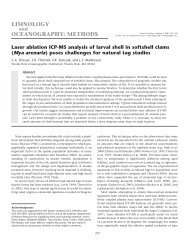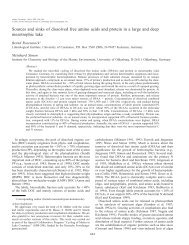CONFERENCE PROGRAM - ASLO
CONFERENCE PROGRAM - ASLO
CONFERENCE PROGRAM - ASLO
Create successful ePaper yourself
Turn your PDF publications into a flip-book with our unique Google optimized e-Paper software.
<strong>ASLO</strong> 2013 <strong>ASLO</strong> Aquatic Sciences Meeting<br />
their awareness and understanding of the ocean to make appropriate decisions<br />
in their everyday lives. This Town Hall will present a review of the<br />
recent trends in informal ocean science education and offer a discussion<br />
of opportunities for future investigation, implementation, and scaling up<br />
of effective practices in informal science education regarding the ocean. A<br />
blue ribbon panel has written a forthcoming report that will form the basis<br />
of this discussion.<br />
TOWN HALL - MARINE MICROBIAL EUKARYOTE<br />
TRANSCRIPTOME PROJECT<br />
Wednesday, 20 February 2013<br />
18:00 to 19:30 - Room 345<br />
This is a town hall meeting focusing on microeukaryote sequencing and<br />
bioinformatics and will feature presentations and discussions focusing<br />
on bioinformatics methods to analyze microbial eukaryote transcriptomes.<br />
Highlights include presentations from the National Center for<br />
Genome Resources about their sequencing methods and their informatics<br />
analysis of data generated by the Marine Microbial Eukaryote<br />
Transcriptome Sequencing Project. This is a collaborative project<br />
supported by the Gordon and Betty Moore Foundation to sequence the<br />
transcriptomes of approximately 750 samples from hundreds of diverse<br />
organisms. The town hall will also feature short presentations from<br />
students and researchers who are developing bioinformatics methods<br />
for transcriptome analysis. In addition, the J. Craig Venter Institute will<br />
present their PhyloMetarep tool, a comparative transcriptomics analysis<br />
and visualization environment. Organizers: Jon Kaye, Gordon and<br />
Betty Moore Foundation; Bethany Jenkins, University of Rhode Island;<br />
P. Dreux Chappell, University of Rhode Island; and Sonya Dyhrman,<br />
Columbia University.<br />
SENSENET SHOWCASE<br />
Wednesday, 20 February 2013<br />
18:00 to 20:00 - Room 342<br />
Young researchers from the SENSEnet project which has focused on in<br />
situ sensors for the marine environment will give short sharp presentations<br />
on their latest work. There will be an opportunity to discuss their work<br />
further over drinks and nibbles.<br />
BE INCLUSIVE I: SHARE YOUR RESEARCH EFFECTIVELY<br />
Wednesday, 20 February 2013<br />
18:00 to 21:00 - Room 344<br />
As individuals, we can strive to communicate in inclusive ways. As members<br />
of academic systems, we can foster practices that support diversity.<br />
This workshop will help you effectively share your research and pathway<br />
to science. The Institute for Broadening Participation’s “Be Inclusive II”<br />
workshop offers strategies to connect with diverse audiences while addressing<br />
barriers to participation. Attending both is recommended but not<br />
required. Food will be provided to the first 50 participants.<br />
BE INCLUSIVE II: ADDRESS BARRIERS TO PARTICIPATION<br />
Thursday, 21 February 2013<br />
12:00 to 13:30 (Lunch Time) - Room 344<br />
As individuals and members of academic systems, we can strive to communicate<br />
in inclusive ways and to foster practices that support diversity.<br />
This workshop will offer ways to connect with diverse audiences while<br />
18<br />
addressing barriers to participation. The Center for Ocean Sciences Education<br />
Excellence’s “Be Inclusive I” workshop will help you effectively share<br />
your research and pathway to science. Attending both is recommended but<br />
not required. Food will be provided to the first 50 participants.<br />
TEACHING LARGE CLASSES<br />
Thursday, 21 February 2013<br />
12:00 to 13:30 (Lunch Time) - Room 346-347<br />
This workshop will be led by Bob Chen, University of Massachusetts,<br />
Boston. Introductory environmental, ocean, and aquatic science courses<br />
provide an excellent opportunity to prepare majors and non-majors for<br />
thinking about some of the largest issues facing society such as climate<br />
change and energy needs. Large courses can also serve to attract students<br />
into the field. This workshop will provide some strategies to overcome<br />
some of the challenges of teaching large courses while making your teaching<br />
engaging, relevant, and effective.Lunch provided by COSEE OCEAN<br />
to the first 25 attendees.<br />
SENSENET PROJECT MEETING<br />
Thursday, 21 February 2013<br />
19:30 to 21:30 - Room 342<br />
SENSEnet final project meeting<br />
FIELD TRIPS<br />
FLOATING PEAT MARSHES OF JEAN LAFITTE NATIONAL PARK<br />
Sunday, 17 February 2013<br />
08:00 to 17:00 - Off-site<br />
The Barataria Preserve of Jean Lafitte National Historical Park and<br />
Preserve is a 20,000 acre expanse of subtropical peat marsh and swamp<br />
forest, located just 15 miles south of New Orleans. The Preserve is situated<br />
in the upper, low-salinity reaches of an interdistributary basin of<br />
the Mississippi River Delta. The floating peat marshes have an atypical<br />
hydrology with subsurface water exchange and limited inundation. The<br />
substrate consists of root-derived organic matter, and is fully buoyant,<br />
moving vertically in response to water level fluctuations. Scrub-shrub<br />
thickets colonize and persist on some of these floating marsh habitats.<br />
Cypress swamp borders the emergent marshes along the low flanks of<br />
relict distributary ridges of the Mississippi River. Bottomland hardwoods<br />
dominate the infrequently flooded ridge-tops and spoil banks.<br />
Signs of declining forest health and encroachment to marsh due to<br />
regional subsidence and relative sea level rise are visible. The tour will<br />
include a boat ride through Preserve waterways, an optional short walk<br />
on a floating marsh and wax-myrtle thicket with extensive Sphagnum<br />
spp. ground cover, and a walk on a boardwalk trail chronicling the transition<br />
from marsh to bottomland hardwood forest in space. We may see<br />
alligators, nutria and possibly poisonous snakes, so come with cameras!<br />
We will see plenty of mosquitoes. Note: Bring calf boots, rain gear, mosquito<br />
repellant. Tour includes lunch.<br />
Participants should meet just prior to 08:00 outside the Convention Center<br />
in front of Hall E. Busses will pick up and drop off from the bus lane<br />
on Convention Center Boulevard in front of Hall E.


